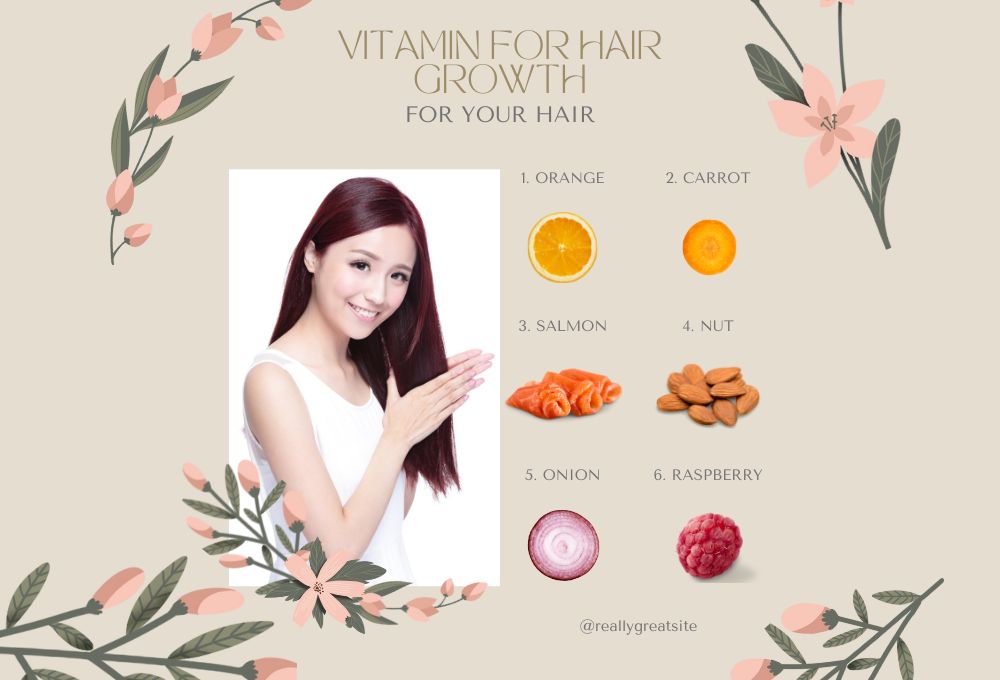
Healthy Hair, Happy You: Top 5 Vitamins for Stunning Hair Growth
Vitamins for Stunning Hair Growth Imagine running your fingers through your hair, and it feels thick, lustrous, and incredibly healthy. Beautiful hair can boost your confidence and make you feel on top of the world. If you’re looking to achieve those stunning locks, you’re in the right place. In this article, we’ll delve into the top 5 vitamins that can supercharge your hair growth, helping you achieve the vibrant, healthy hair you’ve always dreamed of.
1. Vitamin A: The Foundation for Strong Strands
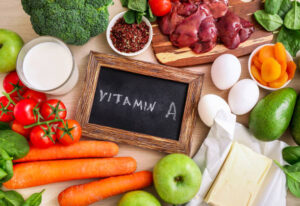
- In our quest for luscious locks and strong, healthy hair, we often overlook the importance of nutrition. We invest in various hair care products, visit salons regularly, and even experiment with different styling techniques, but one key element remains undervalued – Vitamin A. This powerful nutrient is the foundation for strong strands, and in this comprehensive guide, we will unravel the secrets of how it contributes to the health of your hair.
Understanding the Basics
- Before we delve into the intricate ways Vitamin A influences hair health, let’s grasp the basics. Vitamin A is a fat-soluble vitamin that plays a pivotal role in various bodily functions. It is known for its importance in maintaining healthy vision, supporting the immune system, and promoting skin health. However, it’s not just your eyes and skin that benefit from Vitamin A; your hair is a significant beneficiary too.
The Role of Vitamin A in Hair Health
Promoting Hair Growth
- One of the most remarkable aspects of Vitamin A is its ability to stimulate hair growth. Hair grows in cycles, and Vitamin A aids in the production of sebum, an oily substance secreted by the sebaceous glands in the scalp. This sebum acts as a natural conditioner for your hair, keeping it moisturized and promoting growth. Inadequate Vitamin A can lead to dry, brittle hair, and even hair loss.
Strength and Resilience
- Vitamin A also contributes to the strength and resilience of your hair. It plays a significant role in the production of keratin, a protein that forms the structure of your hair. With sufficient Vitamin A, your hair becomes stronger and more resistant to damage, resulting in fewer split ends and breakages.
Preventing Dandruff
- Dandruff can be a persistent and embarrassing issue, but Vitamin A can come to the rescue. It helps regulate the production of sebum, preventing the scalp from becoming too dry or too oily. This balance is crucial in warding off dandruff and maintaining a healthy scalp.
Dietary Sources of Vitamin A
- To harness the benefits of Vitamin A for your hair, it’s essential to include it in your diet. Here are some excellent sources of Vitamin A:
1. Sweet Potatoes
- Sweet potatoes are a nutritional powerhouse, packed with beta-carotene, a precursor to Vitamin A. Consuming sweet potatoes regularly can improve your Vitamin A intake and boost hair health.
2. Carrots
- Carrots are another fantastic source of beta-carotene. They are not only good for your eyes but also your hair.
3. Spinach
- Leafy greens like spinach are rich in Vitamin A and a range of other nutrients that promote hair growth and overall health.
4. Eggs
- Eggs are a versatile source of not only protein but also Vitamin A. Incorporating eggs into your diet can make a significant difference in your hair’s health and appearance.
5. Cod Liver Oil
- For those who prefer supplements, cod liver oil is an excellent choice. It is one of the most concentrated sources of Vitamin A and provides numerous other health benefits.
Recommended Daily Intake
- The recommended daily intake of Vitamin A varies depending on age and gender. However, for adult men, it is approximately 900 micrograms, and for adult women, it’s about 700 micrograms. It’s crucial to achieve a balance in your diet, as excessive Vitamin A intake can have adverse effects.
Vitamin A and Hair Care Products
- In addition to dietary sources, many hair care products are enriched with Vitamin A. Shampoos, conditioners, and serums that contain Vitamin A can help nourish your hair externally. When used in conjunction with a diet rich in Vitamin A, these products can significantly enhance hair health.
The Final Word
- Vitamin A is indeed the foundation for strong, healthy hair. From promoting hair growth to preventing dandruff and enhancing overall hair quality, this essential nutrient has a multitude of benefits. If you aspire to have a head of luscious, vibrant hair, don’t underestimate the power of Vitamin A. Incorporate Vitamin A-rich foods into your diet and consider using hair care products that contain this vital vitamin. Your hair will thank you for it!
2. Biotin: The B Vitamin for Beautiful Hair
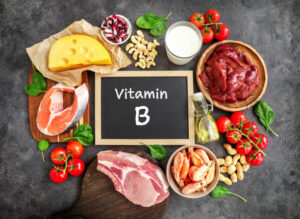
- When it comes to achieving lustrous and healthy locks, many people focus on external treatments, such as shampoos and conditioners. While these products can certainly help, the foundation for beautiful hair often lies in the right nutrients within your body. Biotin, a member of the B-vitamin family, plays a crucial role in promoting hair health and beauty. In this comprehensive guide, we will explore the wonders of biotin and its significance in attaining stunning, vibrant hair.
The Basics of Biotin
- Before we dive into the specifics of how biotin benefits your hair, it’s important to understand what this vitamin is all about. Biotin, also known as vitamin B7, is a water-soluble B vitamin that your body needs for various functions. These functions include converting food into energy and maintaining healthy skin, nails, and, of course, hair.
Biotin and Hair Health
Promoting Hair Growth
- One of the most notable attributes of biotin is its role in hair growth. Biotin supports the keratin infrastructure, which is a fibrous protein that forms the structure of your hair. When you have sufficient biotin in your system, your hair follicles stay strong and healthy, resulting in faster and more robust hair growth.
Preventing Hair Loss
- Hair loss is a common concern for many people, but biotin can be a natural solution. By strengthening the hair follicles and reducing hair breakage, biotin helps minimize hair loss and promotes thicker, fuller hair.
Enhancing Hair Quality
- Biotin isn’t just about quantity; it’s also about quality. This B vitamin helps improve the texture of your hair, making it shinier, more resilient, and less prone to damage. Say goodbye to dry, brittle hair and hello to a smoother, silkier mane.
Dietary Sources of Biotin
- To harness the benefits of biotin for your hair, it’s crucial to incorporate biotin-rich foods into your diet. Here are some excellent sources of biotin:
1. Eggs
- Eggs are not only a fantastic source of protein but also a rich source of biotin. Consuming eggs regularly can significantly improve your hair health.
2. Nuts
- Nuts, particularly almonds and walnuts, are abundant in biotin. They make for a convenient and healthy snack that can enhance your biotin intake.
3. Salmon
- Salmon is a delicious source of biotin that also provides essential omega-3 fatty acids, which promote hair health from within.
4. Avocado
- Avocado is a versatile fruit that not only contains biotin but also offers healthy fats that nourish your hair.
5. Sweet Potatoes
- Sweet potatoes, rich in beta-carotene and biotin, contribute to better hair health and overall nutrition.
Recommended Daily Intake
- The recommended daily intake of biotin varies depending on age and gender. In general, adults should aim for about 30 micrograms per day, but pregnant or breastfeeding women may require more. It’s important to maintain a balanced diet to ensure you’re getting an adequate amount of this essential B vitamin.
Biotin and Hair Care Products
- In addition to dietary sources, many hair care products are infused with biotin. Shampoos, conditioners, and serums that contain biotin can help nourish your hair externally. When used in conjunction with a biotin-rich diet, these products can significantly enhance hair health.
The Final Word
- Biotin, also known as vitamin B7, is the unsung hero in the quest for beautiful, healthy hair. From promoting hair growth and preventing hair loss to enhancing hair quality, this remarkable B vitamin offers a wide array of benefits. If you desire a head of stunning and vibrant hair, don’t overlook the power of biotin. Include biotin-rich foods in your diet, and consider using hair care products that contain this essential nutrient. Your hair will thank you, and you’ll be one step closer to achieving the locks you’ve always dreamed of.
3. Vitamin C: The Collagen Booster
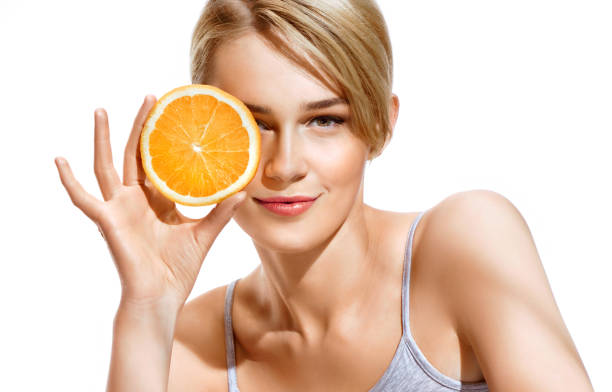
- In the pursuit of radiant and youthful skin, there’s a potent ally that often goes overlooked – Vitamin C. This essential nutrient, known for its immune-boosting properties, is also a powerful collagen booster. In this comprehensive guide, we’ll explore the remarkable role of Vitamin C in promoting collagen production and maintaining healthy, vibrant skin.
Understanding Collagen
- Before we delve into the ways Vitamin C influences collagen, let’s establish the basics. Collagen is a protein that forms the foundation of your skin, cartilage, bones, and other connective tissues. It’s responsible for maintaining the elasticity and firmness of your skin. However, as we age, collagen production naturally declines, leading to wrinkles, fine lines, and sagging skin.
The Role of Vitamin C in Collagen Production
Stimulating Collagen Synthesis
- Vitamin C is a crucial co-factor in the synthesis of collagen. It plays a fundamental role in converting the amino acids proline and lysine into hydroxyproline and hydroxylysine, which are essential for the stability of collagen’s triple helix structure. In simple terms, without sufficient Vitamin C, your body cannot create strong and stable collagen.
Antioxidant Properties
- Vitamin C is a potent antioxidant, which means it combats the damaging effects of free radicals. Free radicals are unstable molecules that can harm collagen and lead to premature ageing of the skin. By neutralizing these free radicals, Vitamin C helps preserve existing collagen and prevents its degradation.
Brightening Skin Tone
- Vitamin C also inhibits the production of melanin, the pigment responsible for dark spots and uneven skin tone. By reducing melanin production, Vitamin C can help improve skin’s radiance and even out skin tone, giving you a more youthful appearance.
Healing and Repair
- When your skin is exposed to the sun, pollutants, or other environmental stressors, it can become damaged. Vitamin C aids in the repair process by promoting the growth of new, healthy skin cells. This is especially beneficial for addressing scars and blemishes.
Dietary Sources of Vitamin C
- To harness the benefits of Vitamin C for collagen production and skin health, it’s crucial to incorporate Vitamin C-rich foods into your diet. Here are some excellent sources of Vitamin C:
1. Citrus Fruits
- Oranges, grapefruits, and lemons are well-known sources of Vitamin C. They make for delicious and refreshing additions to your daily intake.
2. Berries
- Strawberries, blueberries, and raspberries are not only packed with antioxidants but are also rich in Vitamin C.
3. Bell Peppers
- Bell peppers, particularly the red and yellow varieties, are excellent sources of Vitamin C and can be included in various dishes.
4. Kiwi
- Kiwi is a small but mighty fruit that offers a significant amount of Vitamin C and other essential nutrients.
5. Broccoli
- Broccoli is a versatile vegetable that provides a healthy dose of Vitamin C and other vitamins and minerals.
Recommended Daily Intake
- The recommended daily intake of Vitamin C for adults varies but typically falls between 65 to 90 milligrams. However, the optimal intake may be higher for those looking to boost collagen production and achieve skin benefits.
Vitamin C in Skincare Products
- In addition to dietary sources, Vitamin C is a popular ingredient in skincare products. Serums, creams, and masks formulated with Vitamin C can be applied topically to further enhance their skin benefits. Look for products that contain stable forms of Vitamin C, such as ascorbic acid, for the best results.
The Final Word
- Vitamin C is not just a vitamin; it’s a collagen booster and a secret weapon for maintaining youthful, vibrant skin. Its ability to stimulate collagen production, protect against free radicals, brighten skin tone, and support healing and repair makes it an invaluable component of any skincare routine. To unlock the full potential of Vitamin C, incorporate Vitamin C-rich foods into your diet and consider using skincare products that harness its power. With Vitamin C by your side, you’ll be on the path to healthier, more youthful-looking skin.
4. Vitamin E: Your Scalp’s Best Friend
When it comes to achieving a healthy and nourished scalp, one often overlooked but crucial ally is Vitamin E. This essential nutrient, celebrated for its antioxidant properties, plays a pivotal role in maintaining the health and vitality of your scalp. In this comprehensive guide, we’ll explore the wonders of Vitamin E and its significance in promoting a thriving scalp.
The Basics of Vitamin E
- Before we dive into the specific ways Vitamin E benefits your scalp, let’s establish a foundational understanding of this remarkable vitamin. Vitamin E is a group of fat-soluble antioxidants, with alpha-tocopherol being the most biologically active form. It is renowned for its ability to combat free radicals and protect cells from oxidative damage.
Vitamin E and Scalp Health
Nourishing the Scalp
- One of the primary roles of Vitamin E is its exceptional ability to nourish the scalp. It enhances blood circulation to the scalp, ensuring that hair follicles receive a rich supply of oxygen and essential nutrients. This increased circulation leads to a healthier scalp and can even promote hair growth.
Antioxidant Protection
- The scalp is exposed to various environmental stressors, such as UV rays and pollution, which can cause oxidative stress and damage. Vitamin E, as a powerful antioxidant, helps shield the scalp from these harmful factors, reducing the risk of scalp conditions and ensuring a healthier environment for hair growth.
Reducing Scalp Inflammation
- Inflammation of the scalp can lead to discomfort and even hair loss. Vitamin E has anti-inflammatory properties that can alleviate scalp irritation and redness. It soothes the scalp, making it an effective remedy for conditions like dandruff and psoriasis.
Hydration and Moisture
- Vitamin E plays a crucial role in maintaining the scalp’s moisture balance. It prevents the scalp from becoming dry and flaky, reducing the risk of itchiness and dandruff. A well-hydrated scalp is essential for overall scalp health and optimal hair growth.
Dietary Sources of Vitamin E
- To harness the benefits of Vitamin E for your scalp, it’s essential to include Vitamin E-rich foods in your diet. Here are some excellent sources of Vitamin E:
1. Nuts and Seeds
- Almonds, sunflower seeds, and hazelnuts are packed with Vitamin E and make for convenient and healthy snacks.
2. Spinach
- Leafy greens like spinach are not only rich in iron but also a good source of Vitamin E.
3. Avocado
- Avocado is a versatile fruit that offers healthy fats and Vitamin E, making it an excellent choice for scalp health.
4. Olive Oil
- Olive oil is not only a culinary delight but also contains Vitamin E, which can be incorporated into your diet or used topically.
5. Broccoli
- Broccoli is a nutrient-rich vegetable that contains Vitamin E, along with a host of other essential vitamins and minerals.
Recommended Daily Intake
- The recommended daily intake of Vitamin E for adults is about 15 milligrams (22.4 IU). However, individual requirements may vary, so it’s advisable to consult with a healthcare professional for personalized guidance.
Vitamin E in Hair and Scalp Products
- In addition to dietary sources, many hair and scalp products are formulated with Vitamin E. Shampoos, conditioners, and hair oils that contain Vitamin E can be an excellent addition to your hair care routine. These products help maintain scalp health and ensure your hair receives the nourishment it needs.
The Final Word
- Vitamin E is not just an antioxidant; it’s your scalp’s best friend. Its ability to nourish the scalp, provide antioxidant protection, reduce inflammation, and maintain hydration makes it an essential component of a healthy scalp. To unlock the full potential of Vitamin E, incorporate Vitamin E-rich foods into your diet and consider using hair and scalp products that harness its power. With Vitamin E by your side, you’ll be well on your way to a healthy, thriving scalp.
5. Vitamin D: The Sunshine Vitamin for Hair
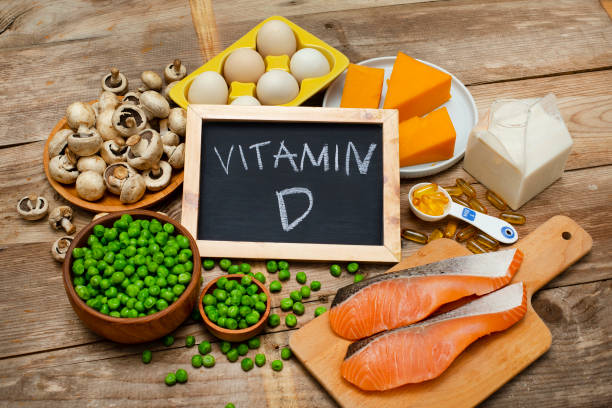
When it comes to maintaining healthy and lustrous hair, one often underestimated element is the “sunshine vitamin” – Vitamin D. This essential nutrient, primarily known for its role in bone health, also plays a significant part in ensuring your hair looks its best. In this comprehensive guide, we will delve into the world of Vitamin D and its crucial importance in nurturing your hair.
Unveiling Vitamin D
- Before we explore how Vitamin D contributes to hair health, let’s start with the basics. Vitamin D is a fat-soluble vitamin that your body can produce when exposed to sunlight. It’s vital for various functions, including maintaining strong bones, supporting the immune system, and, as you’ll discover, promoting healthy hair.
The Connection Between Vitamin D and Hair Health
Promoting Hair Growth
- Vitamin D is essential for the hair follicle’s cycle, which includes the growth phase. It encourages hair follicles to grow, leading to thicker and longer hair. Inadequate Vitamin D levels can result in slower hair growth and may even contribute to hair loss.
Preventing Hair Thinning
- Hair thinning is a common concern for both men and women. Vitamin D plays a role in preventing hair thinning by promoting the generation of new hair follicles. This not only prevents hair from becoming sparse but also enhances its overall thickness.
Reducing Hair Loss
- Hair loss can be distressing, but Vitamin D can offer some relief. It helps reduce hair loss by promoting hair follicle health and minimizing shedding. By ensuring that your hair remains firmly rooted in your scalp, Vitamin D can help maintain your hair’s volume.
Preventing Hair Aging
- Ageing can lead to changes in hair texture and even greying. Vitamin D’s antioxidant properties help combat the oxidative stress that can lead to hair ageing. By protecting your hair from environmental damage, it helps maintain its youthful appearance.
How to Get Your Vitamin D
- To ensure that your hair reaps the benefits of Vitamin D, consider the following sources:
1. Sunlight
- The most natural source of Vitamin D is sunlight. Spending time outdoors, especially during sunny days, allows your skin to produce Vitamin D. Aim for about 10-30 minutes of sun exposure on your skin a few times a week.
2. Dietary Sources
- Include foods rich in Vitamin D in your diet. These can include fatty fish like salmon and mackerel, fortified dairy products, and Vitamin D supplements if recommended by your healthcare provider.
Recommended Daily Intake
- The recommended daily intake of Vitamin D can vary depending on factors like age, sex, and lifestyle. However, the average daily intake for adults falls around 600-800 IU (International Units).
Vitamin D in Hair Care Products
- In addition to natural sources and dietary intake, Vitamin D is also found in some hair care products. Shampoos and conditioners containing Vitamin D can provide direct nourishment to your hair and scalp, supporting their health and vitality.
The Final Word
- Vitamin D, often referred to as the sunshine vitamin, is a vital element in the pursuit of healthy and vibrant hair. From promoting hair growth to preventing hair thinning and loss, it plays a significant role in maintaining the beauty and health of your hair. To ensure your hair benefits from Vitamin D, get some sun exposure, include Vitamin D-rich foods in your diet, and consider incorporating hair care products containing this essential nutrient. With Vitamin D as your ally, you’re one step closer to achieving the hair you’ve always desired.
Conclusion: Nourishing Your Way to Beautiful Hair
Incorporating these five vitamins into your daily diet can make a world of difference in your journey to stunning, healthy hair. Remember, while vitamins are important, they are just one piece of the puzzle. A well-balanced diet, proper hair care, and avoiding excessive heat and chemicals are also key factors. Embrace these vitamins, make healthy choices, and soon you’ll be enjoying the luscious, vibrant hair you’ve always desired. So, nourish your hair with care and watch it flourish into its natural beauty.

